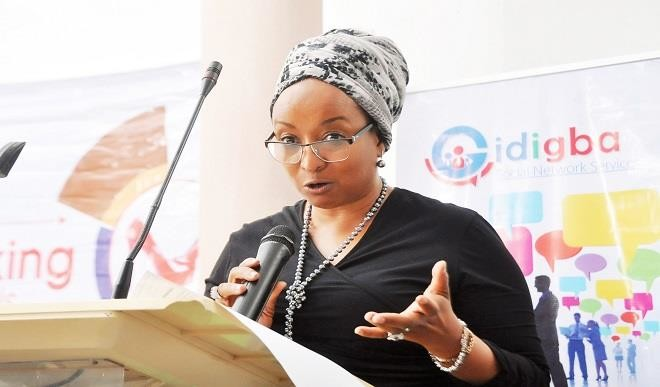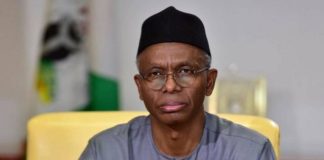Maryam Uwais, the special adviser to President Muhammadu Buhari on the National Social Investment Programme(NSIP) informed the National Assembly today that the programme received between 2016 and 2017 N175 billion out of the N1 trillion approved in the budgets for the two years.
Uwais’ clarification came after Senator Danjuma Goje, chairman of the Senate Committee on Appropriation said Nigerians had not felt the impact of the programme, claiming that the National Assembly had approved a N1.5 trillion budget for it in three years.
Goje made this observation when Uwais, appeared before the Committee on Appropriation to provide clarification on 2018 budget estimate.

But his comment appeared to have been based on an incorrect notion that the programme had gobbled ”N1.5 trillion” approved by the National Assembly, as Uwais said the programme received a total of N175 billion between 2016 and 2017.
According to the State House website, the programme kicked off in 2016 and it logically followed that it did not feature in the 2015 budget bequeathed by the Jonathan administration.
The special adviser said: “You may kindly recall that a sum of N500 billion was appropriated for the NSIP budget in 2017, out of which N100 billion was allocated for the Social Housing Scheme under the Federal Ministry of Finance.
“Further more, out of the balance N400 billion, only N90 billion was released to the NSIP for the year 2017.”
She also said that the programme received the sum of N85 billion in 2016.
“Unfortunately, N100 billion is deducted at source for Housing Scheme by the Federal Ministry of Finance.”
However, Goje was unsparingly critical of the programme, saying it was gradually going the way of the disbanded Subsidy Reinvestment and Empowerment Programme (SURE-P) of the Goodluck Jonathan administration.
He said the Senate would not hesitate to drastically reduce the yearly allocation of N500 billion to NSIP if its performance did not improve.
Goje, who stressed the importance of the programme, noted that by the end of three years, the NSIP would have handled N1.5 trillion which, according to him, is unprecedented.
“Many people are complaining that they have not seen the impact of the programme considering the magnitude of the fund involved.
“I am from Gombe State, I represent Gombe Central. I am yet to see one single boy who came to tell me that he has benefited from your N500 billion.
“Many other Nigerians are saying the same thing. N500 billion for 36 states is about N13 billion. If you spend N13 billion in one year in Gombe State, there is no way I would not have known, other people will also know.
“If you spend N500 billion in one year in Nigeria, Nigerians will know. No single All Progressives Congress person from Gombe State has benefited from your School Feeding Programme.
“No single person from Gombe State has benefited from your N-Power. We don’t know about your N-Power. As far as many of us are concerned, we are completely dissatisfied with what you are doing,” he said.
Goje also said that there was no indication to show that N100 billion is deducted from source for Social Housing Scheme by the Ministry of Finance.
The Social Investment Programme already has 200,000 Nigerian graduates from all over the country under its N-Power Programme, with each person receiving a stipend of N30,000 a month. An additional 300,000 graduates have been shortlisted for the next phase of the programme, according to the Media office of Vice President Yemi Osinbajo.
Out of the enumerated 439,859 poor and vulnerable households in 23 states under the National Social Safety Net Programme, 297,973 are already benefiting from the cash transfer programme.
In addition, 6,044,625 pupils in 33,981 primary schools in 20 states are being fed under the Home-Grown School Feeding Programme by 61,352 cooks employed by the scheme.
Under the Social Investment Programme, 259,451 loans were issued through the Government Enterprise and Empowerment Programme across 36 states and FCT, out of the 478, 388 eligible beneficiaries whose applications were processed.













